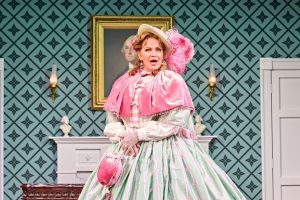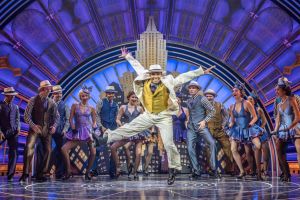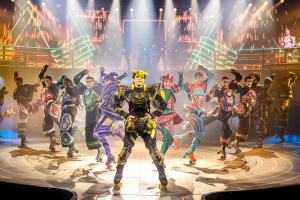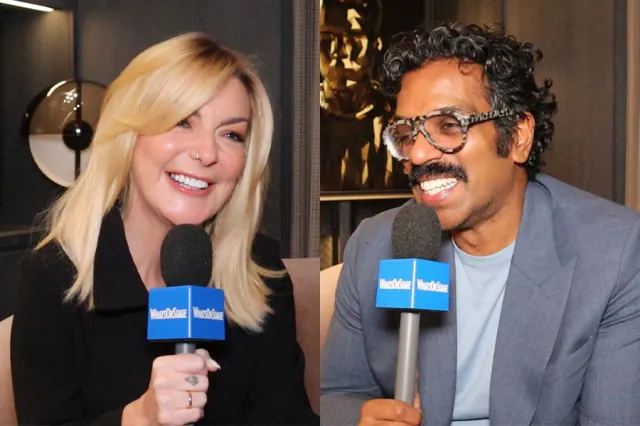20 Questions With…Mark Ravenhill
Playwright Mark Ravenhill, whose new play Mother Clap’s Molly House opens this week at the NT Lyttelton, discusses history, sub-culture and a desire to be Jennifer Aniston.
Mark Ravenhill rose to fame, acclaim and notoriety with Shopping and Fucking, his first full-length play.
After staging a short piece, Fist, as part of the I’ll Show You Mine season in London, he was prompted to write a larger scale work. Shopping and Fucking opened at the Royal Court in London in 1996, transferred to the West End and undertook a national tour.
His other works include Faust Is Dead and Handbag for the Actors Touring Company, Sleeping Around and Some Explicit Polaroids. Mother Clap was inspired by real events from 1720s London, and the trials for sodomy of men arrested in gay brothels known as molly houses. The play is also partly set in the present day, as a group of gay men prepares for a wild night out.
Date & place of birth
Born in Haywards Heath, Sussex on 7 June 1966.
Now lives in…
Camden, north London.
Trained at
I did a degree in Drama and English at Bristol University.
First big break
When Max Stafford-Clark came to see a short piece of mine called Fist at London’s Finborough Theatre, he asked if I had any full length plays written. I said that I had, even though I hadn’t, and quickly set about preparing Shopping and Fucking.
Career highlights
It’s all been exciting so far, but I particularly recall the first West End night of Shopping and Fucking. Finding out that something you thought would end up being performed by friends in a pub theatre could actually hold a big audience, was rather special.
Favourite actor/actress you’ve worked with
Certainly at the moment it would be Deborah Findlay who plays Mother Clap. She’s also performing Paulina in The Winter’s Tale at present, and I think she’s fantastic.
Which play (by someone else) would you most like to have written?
King Lear as it’s probably the greatest play ever written. It follows such a huge journey for the central character, going to the extremes of madness and then climbing back. I wouldn’t say I identify with it as such, because great art goes beyond personal empathy, although you do have the sense of seeing yourself in there somewhere. There’s a real feeling of being at the centre of something so painful.
In your opinion, what’s the best thing currently on stage?
I recently saw Lady Macbeth of Mtsensk at the London Coliseum. I’d never heard the piece before, but it was an amazing production with a fantastic score.
Do you feel yourself to be part of a ‘new movement’ of writers?
I wouldn’t go quite so far as to call it a new movement. It is nice to catch up with other writers, and I’ve met the likes of Patrick Marber and Charlotte Jones around the National Theatre. We talk over problems or recent successes, and it’s great to have people of a similar age and approach around you. Playwrights are a rare breed, and I like meeting them.
For all its sexual frankness, Shopping and Fucking was rarely referred to as a ‘gay play.’ Did this surprise you?
I quickly realised it wasn’t being regarded as just a gay play and nothing more, but on reflection it wasn’t such a surprise. There had been a fair bit of work produced in the preceding five years, by the likes of Kevin Elyot and Jonathan Harvey, which had introduced gay characters. In fact, it had reached the extent where I was probably lucky to arrive at a time when it didn’t seem so out of the ordinary. Therefore, the characters being gay didn’t necessarily seem to define the whole play. I tend to personally avoid going to see things that are labelled obviously as gay works. To a certain extent, I’m aware that gay people may also seek out my plays, but I think that the vast majority of the audiences aren’t gay.
After your debut play ran in the West End for six months, did it put pressure on you to create a more commercial follow-up, or did it provide greater artistic freedom?
It certainly gave artistic freedom in the sense that it provided financial freedom too. I didn’t have to worry about paying the rent and bills anymore. There’s part of you that realises you want to have another hit, and you can end up getting blocked by that. You have to switch off that nagging voice inside your head and write what you want to. The first draft of a play is always written for myself, as a starting point. The larger connections are made from then on, but it has to start off as something I actually want to do.
What advice would you give to the government to secure the future of British theatre?
The whole system of regional theatres, as centres of excellence, needs to be more strongly supported. That’s really the place to invest, to allow the venues to develop a wider audience and become still more adventurous. We strongly need our whole network of regional theatres.
If you could swap places with one person (living or dead), who would it be & why?
Jennifer Aniston, so then I could get closer to Brad Pitt…
Favourite book
A Handful of Dust by Evelyn Waugh.
Favourite holiday destination
Copenhagen. Having been there recently, I can highly recommend it. There’s something very civilised about the Danish way of life.
What inspired you to write about Mother Clap’s house in Holborn?
References to that era, its sub-culture and hidden history seemed to keep cropping up in academic books. Later I went back to a library in Cambridge and read court records dating back to sodomy trials around 1726. These records provided a source of what was written down and what stories were told during the hearings. At that time, there were about 40 molly houses (a type of gay brothel) across a London that was far smaller than it is today. This means that there would have probably been one in each neighbourhood and that a blind eye was turned by and large to them. So before all the moral reforms came in, a thriving gay subculture would have existed within the capital. I didn’t want to focus on the death penalty that was implemented for sodomy at the time, as that would have resulted in another strain of writing that deals with victims and persecution. The play would then have been about homophobia and not about homosexuality.
How and why does music play such an important part in this production?
From the beginning I knew music would be used. The trial records state that a fiddler was overheard in the molly house playing a song called “Come Let Us Fuck Finely”. I could just imagine that really clearly! Music plays an integral part in any sub-culture, be it the peace movement or the gay one, with songs and a style of music that helps to define it. Mother Clap, which jumps from the 1720s to the present day, features a mix including mock hymns, 18th-century folk, baroque opera, contemporary pop and rap.
Do you see any irony in a fairly anti-establishment playwright being presented at the National?
No, as this really couldn’t have been presented anywhere else. There’s lots of characters and theatricals involved, and the National’s staging and funding potential meant that it was the ideal venue.
You’re known to enjoy writing with the actors around. How much ‘workshopping’ went on in the creative rehearsals for Mother Clap’s Molly House?
We did a reading workshop at the National Theatre Studio in March, after which I went away and did another draft. The script then evolved and went through further rewrites after subsequent rehearsals.
Do you have anything to add about your future plans?
My immediate future concerns having a holiday. I’ve been offered the use of a house in Spain for a couple of weeks, so I’m going to sit in Spain and maybe think about what to write next.
– Mark Ravenhill was speaking to Gareth Thompson
Mother Clap’s Molly House opens at the National Lyttelton on 4 September 2001 and continues in repertory.












